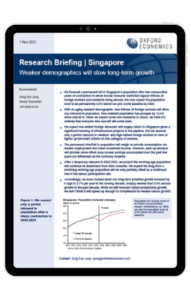Weaker demographics will slow long-term growth in Singapore

We forecast a permanent hit to Singapore’s population after two consecutive years of contraction in which border closures restricted regular inflows of foreign workers and residents living abroad. We now expect the population level to be permanently 2.6% below our pre-Covid baseline by 2030.
What you will learn:
- With an aging resident demographic, new inflows of foreign workers will drive any rebound in population. Non-resident population has plunged by 12.6% since mid-2019. While we expect some non-residents to return, we think it’s unlikely that everyone who has left will come back.
- The permanent shortfall to population will weigh on private consumption via weaker employment and lower household income. However, pent-up demand will provide some offset once excess savings accumulated over the past few years are withdrawn as the economy reopens.
- We have also revised down our long-term potential growth forecast by 0.1ppt to 2.7% per year in the coming decade, sharply weaker than 3.8% annual growth in the past decade. While we still forecast robust productivity growth, we don’t think it will speed up enough to compensate for weaker labour growth.
Tags:
Related Services

Post
The euro and depreciation – shake, shake it off
Our new forecast assumes a slower euro appreciation against the dollar over the coming years than we previously anticipated. Relative productivity, terms of trade, and the current account will likely be less supportive of the euro than we thought. In addition, a stronger stock market than initially envisaged will attract more financial flows into the US than we had expected.
Find Out More
Post
Food prices to bottom out in 2024, risks skewed to upside
Our baseline forecast is for world food commodity prices to register an annual decline this year, in aggregate, reducing pressure on food retail prices further downstream. However, we believe the risks to this forecast are overwhelmingly skewed to the upside.
Find Out More